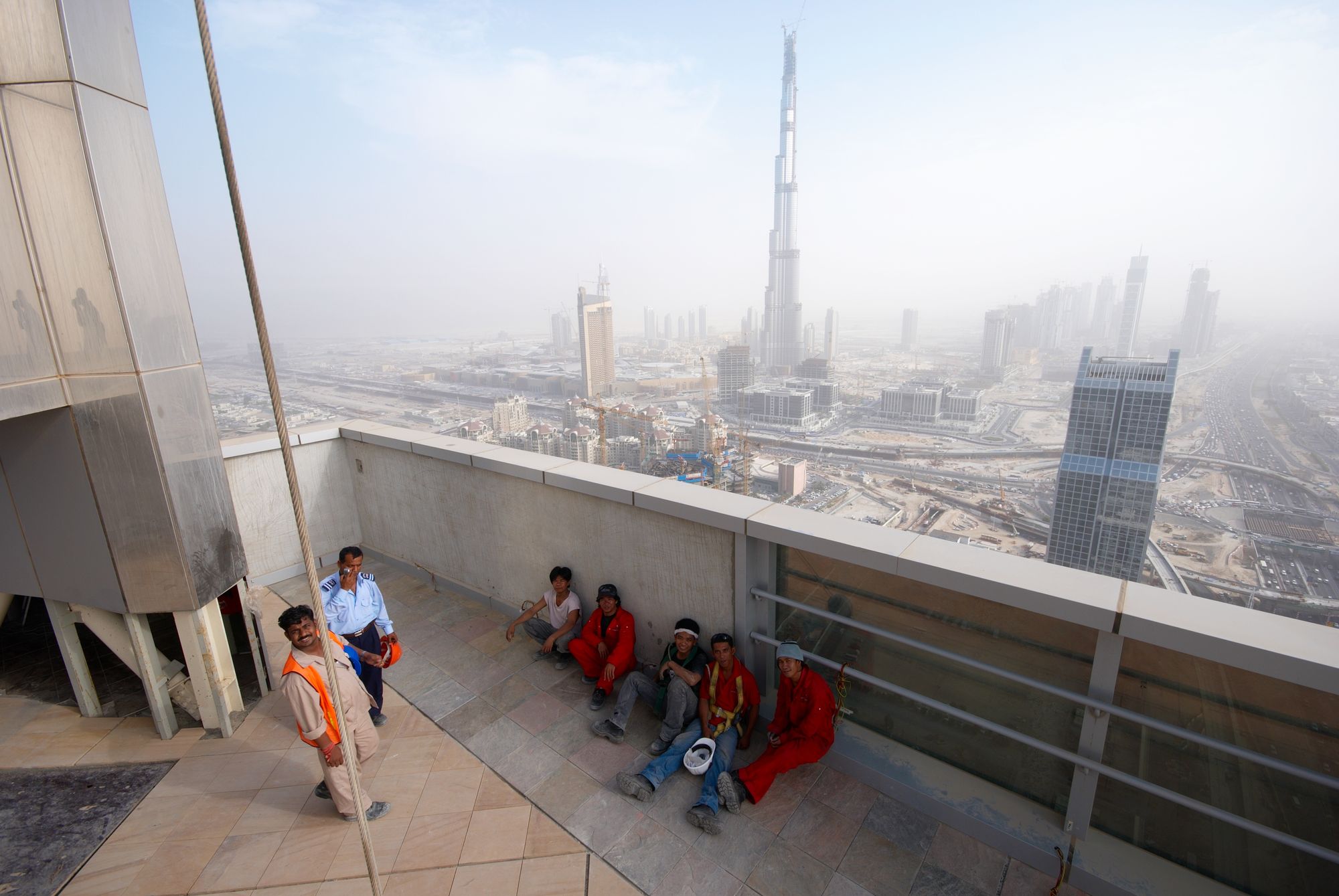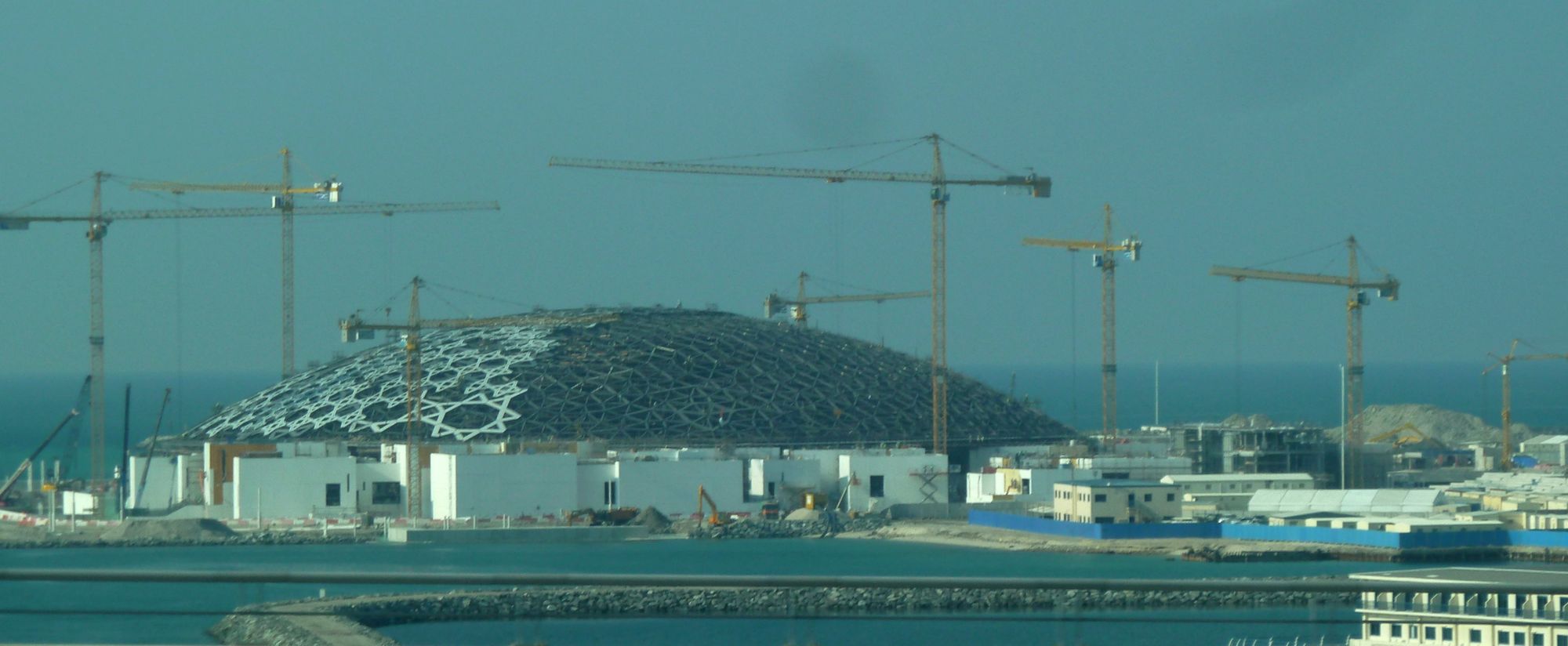With almost 90 percent of its population consisting of foreigners, the United Arab Emirates tops the list of nations hosting large numbers of immigrants. This may come as a surprise to many, and perhaps rightfully so, since international coverage of the country has mostly focused on the skyscrapers and the luxury hotels of Dubai. What has been left largely unseen are the living conditions of many of the UAE's migrant workers, who hail predominantly from South Asian nations such as India, Bangladesh, and Pakistan. Over the years, reports have surfaced claiming that migrant workers are consistently treated unfairly, have their passports confiscated, and their domestic and international movement restricted. Even though the UAE is viewed by potential migrant workers as a “land of hope,” the experiences of those who make it to the country and go through the employment system may, and probably should, lead to a change of this view.
The Kafala System
Like the rest of the Gulf Cooperation Council member nations, in the UAE's Kafala system, migrant workers are essentially “sponsored” by their employers, who are mostly private companies looking for sources of cheap labor. On paper, the Kafala system grants employees multiple basic rights in the form of annual and maternity leave, as well as a guarantee of regular wage payments. The system also bans employers from confiscating employees’ passports or having employees work more than eight hours a day. However, a 2019 US State Department report noted that the Emirati government “rarely investigated” violations of the Emirati law governing the Kafala system, which occur in the form of frequent passport confiscations and irregular or no payment of wages. This lack of regulation allows employers to often confiscate employees’ passports, forces them to reside in crowded labor camps, and restricts the financial independence of the employees through imposing recruitment fees, rendering the on-paper Kafala rights granted impracticable. In addition to the lack of regulation, the UAE has no minimum wage set for migrant workers, does not allow workers to join unions, and forces them to receive the “permission” of their employer before changing or quitting a job. These restrictions lead to a view of the Kafala system and the Emirati employment procedures as an example of “modern slavery.”
The Recruitment Fee Issue
If one were to classify the employment process in the UAE as modern slavery, recruitment fees would serve as the first step towards enslavement. Even before arriving in the UAE, migrant workers find themselves having to pay recruitment fees to agencies that can secure them jobs in the UAE. Those that are not able to pay the fee upfront are assisted by their employers, who end up paying the agencies that find employers from abroad. Per Emirati law, it is illegal for employers to force their employees to pay these recruitment fees. Yet, it is often the case that when workers want to quit, they are forced by their employers to pay back the recruitment fee that the employers had initially paid. Paying back is not easy: many workers have to work for up to a year just to be able to pay the recruitment fee back to the employer. In other cases, the employers deduct certain amounts from the wages of the workers to cover the recruitment fee. In the end, it is almost always the migrant workers that have to bear the burden of the recruitment fees despite Emirati law clearly banning employers from forcing workers to pay the fee.
So, You’ve Made it to the UAE, Now What?

Once a migrant worker arrives in the UAE, it is often the case that their passport will be confiscated right away at the airport. Employers justify these confiscations by claiming that they need the employees’ passports so that their visas can be issued. Other excuses include concerns about the safety of the passports if the workers keep holding on to them. Sometimes workers themselves give up their passports out of fear of losing them or having them stolen. However, even for the purposes of “safekeeping,” it is almost always the case that the employees do not have direct access to their passports.
Once employers have trapped their employees in the UAE by confiscating their passports, they have them sign lengthy contracts, which are often in Arabic or English, with little to no assistance with translation. After starting work, employees find themselves having to live in packed accommodations, sometimes with up to 10 people trying to inhabit one room. According to Human Rights Watch, some workers were only given food after their work for the day was done. Other reports include employers deducting food costs from their employees’ salaries. If a worker were to fall ill, it would often be the case that the cost of health care provided would be deducted from their salary. Those that are less lucky have no access to health care at all, especially for conditions that arise due to inadequate working conditions or physical abuse.
The lack of labor unions for migrant workers means that there is no official platform for the employees to defend their rights and demand better working and living conditions. Organizing protests is one option, but protests in the UAE usually end with arrests and contract terminations. Strikes are also prohibited. It is common for workers to get deported for striking, often after being left unpaid for several months. In 2013, a strike organized by a group of employees of the construction firm Arabtec led to dozens of employees being deported and the strike broken with support from the police. The government appears to collude with the owners of private companies like Arabtec and mobilize the police, which, as in almost all authoritarian regimes, seems to have become a tool to serve the interests of the government and the private companies, rather than a neutral force that provides security. More recently, in 2020, 500 workers of AMB-Hertel, the Emirati branch of the French firm Altrad, went on strike as they were left unpaid. Reports claim that some workers were even laid off for going on strike and could not receive their pay despite having earned it.
Western Accomplices
Altrad, the French multinational construction company, is only one of the many Western establishments that seem to forget the laws and regulations of the countries they are based in once they start operations abroad in the UAE. Altrad is joined by New York University (NYU), Hilton, the Louvre, Guggenheim, and the British Museum in conducting alleged malpractice against migrant workers. Those who took part in the building of NYU’s Abu Dhabi campus faced similar obstacles, including having their passports confiscated and being forced to pay recruitment fees. Although NYU had instated “labor protections,” which were supposed to ensure that laborers working to build the campus would enjoy better protections compared to UAE standards, these additional protections were almost nonexistent on the ground. NYU has stated that the additional protections did not apply to workers who were on short-term contracts (approximately 10,000 of the 30,000 laborers). To those for whom the protections did apply, NYU would, on paper, reimburse the recruitment fees. However, the University claims that “it couldn’t verify that workers had paid fees for the NYU campus project and not a prior one.” Despite the added protections, NYU seems to have failed to foresee the potential difficulties that would be encountered in a system that is already very difficult to navigate for migrant workers.
Employees of Hilton Abu Dhabi reportedly experienced similar coercion by their employers, in the form of being forced to surrender their passports. Pacific Standard claims that the hotel management would have the employees sign a form that ensured that the employees were “voluntarily” turning in their passports for “safekeeping,” as Hilton also said as part of an official statement. Despite the supposed voluntary nature of the surrender of passports, employees of Hilton Abu Dhabi claimed that those who did not give up their passports carried the risk of having their contracts terminated or incurring unjustified fines. Hilton, as part of the statement it made, claimed that the employees were “welcome to take back their passports at any time,” yet the employees disagree as they think these practices are “all about control.”

Migrant workers employed on the Saadiyat Island project, where Louvre, Guggenheim and other museums are located, faced similar challenges without receiving any form of concrete support from Western companies and organizations. The Louvre, in particular, has never publicly announced a plan that would protect the rights of those working to build the Abu Dhabi branch of the museum. Unpaid wages, arbitrary detentions, deportations, and threats were common occurrences for those working at the Louvre site. Other reports suggest that Louvre workers had to work for up to a year just to be able to pay the recruitment fees back, with some workers who went on strike being left unpaid and deported. According to the reports, there have also been “violent clashes” among migrant workers, which may have been provoked by the hiring of strikebreakers. The clashes, which involved physical conflict, resulted in multiple workers being hospitalized and some getting arrested. The British Museum, which has a partnership with the Zayed National Museum of Abu Dhabi, attributed these clashes to conflicts between “rival gangs of workers.” In its statement, the British Museum also claimed that they were not aware of any disputes “regarding pay or working conditions on Saadiyat Island.”
There is no doubt that the UAE has to make significant progress towards protecting the basic rights of migrant workers that migrate there in hopes of building a better, more prosperous future. Yet, this seems quite infeasible especially when establishments that would be deemed “Western” or “humanitarian” tend to adapt quite rapidly to the inhumane norms of the UAE. Situations where workers’ passports are confiscated, wages are left unpaid, or worse, where workers are detained and deported would all cause tremendous outrage if they happened in the West. However, it seems to be the case that when employees are mistreated in a different country, far away from the safety of the protective laws and regulations of countries like the United States, the United Kingdom, or France, these Western establishments tend to remain disappointingly quiet. While the majority of the Saadiyat Island projects mentioned above have been completed, the Zayed National Museum, which is to open in 2022, and Guggenheim Abu Dhabi, set to open in 2025, remain under construction. As the UAE commences more alluring projects, it is absolutely crucial for both her and her Western partners to thoroughly review the status of migrant workers and act to implement policies that protect their rights and ensure their safety.





